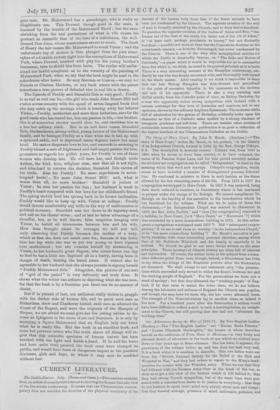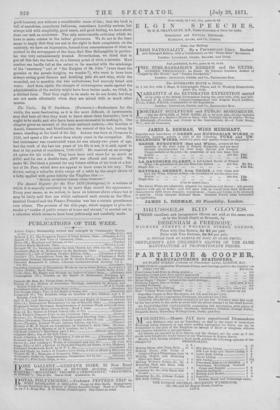Our _Adventures during the War of 1870-71. By Two English
Ladles. (Bentley.)—The "Two English Ladies" are "Emma Maria Pearson" and "Louisa Elizabeth Maelaughlin," the former of whom describes herself as the authoress of From Rome to Mentana,—a very lively and pleasant sketch of adventure in the track of war which we noticed some three or four years ago in then columns. She has been, it allpeare, the ponwoman of the volume before us, and has done her task very well. It is a book which it is needless to describe, The two ladies went out from the "British National Society for the Relief of the Sick and. Wounded in War," and they had orders to repair to the King's head- quarters for service with the Prussian army. When we say that they had followed with the Gorman army close in the track of the war, so close as to got a full view of the horrors which it left behind it ; that they had strong French sympathies, but at the same time were pos- sessed with a conscientious desire to do justice to everybody ; that they do not hesitate to speak their mind very plainly about men and things ; that they showed courage, presence of mind, endurance, patience, and
good-humour, not without a considerable sense of fun ; that the book is full of anecdotes, sometimes ludicrous, sometimes horribly serious, but always told with simplicity, good sense, and good feeling, we have about done our task as reviewers. The only unfavourable criticism which we have to make relates to the ladies' grievances. We do not in the least mean to imply that they are not in the right in their complaints, on the contrary, we have an impression, formed from remembrances of what we noticed in the newspapers of the time, that Miss McLaughlin in particu- lar was very unhandsomely treated. Nevertheless, we think that to put all this into the book is, in a literary point of view, a mistake. Most readers can hardly fail at the outset to be wearied with the misdoings of the "secretary" and of "the Knights of Sb. John "(were these the genuine or the pseudo-knights, wo wonder?), who seem to have boon always eating good dinners and drinking pale ale and wine, while the wounded, not to mention the two authoresses, had scarcely bread and water. And then, again, the charges of extravagance made against the administration of the society might have boon better made, we think, in a distinct form. That they ought to be made we do not doubt, but they are not made effectually when they are mixed with so much other matter.

































 Previous page
Previous page